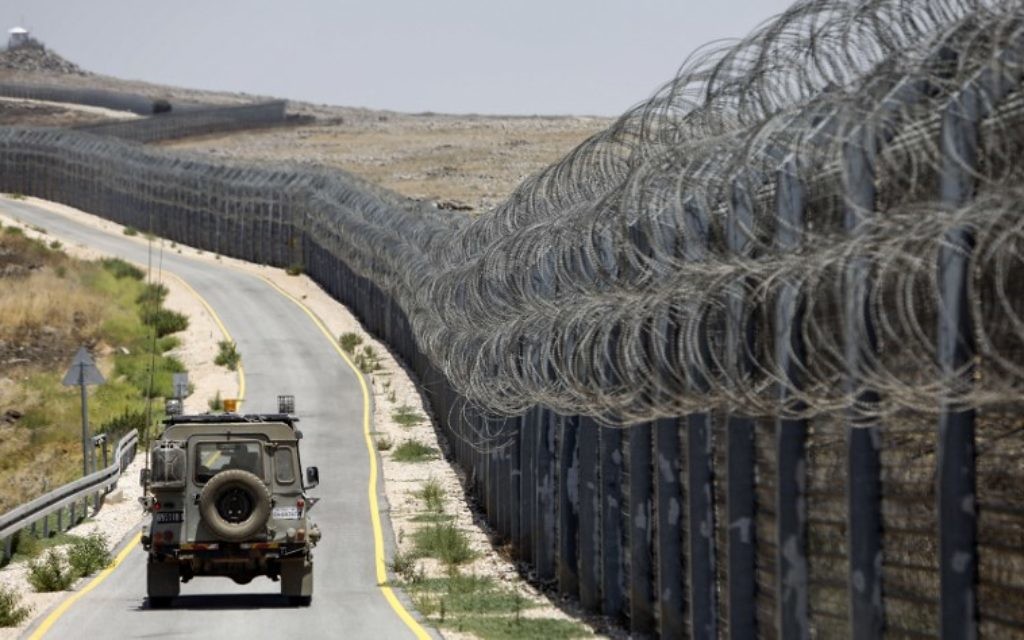The Syrian president is more beholden than ever to the IRGC and Hezbollah, which have no interest in keeping things quiet along the border

The evacuation of several hundred Syrian rebels from the Beit Jinn area on the Syrian side of the Golan Heights over the weekend puts Israel in an old-new position on the border. Assad’s army is once again at the fences, just like they were from 1967 to 2011.
In the southern Golan, a few pockets of resistance remain from supporters of the Islamic State, or as they are known locally, the Khalid Ibn Walid Army, but beyond that, the Syrians have almost completely retaken control of the border with Israel.
Get The Times of Israel’s Daily Edition by email and never miss our top stories FREE SIGN UP
On the other side, no moderate forces remain that would maintain some relative cooperation with Israel or keep the Shiite or Sunni extremists at bay. The actual evacuation took place quietly, and the buses carrying nearly all the rebels and their supporters have already made their way from the slopes of Mount Hermon to the last bastion belonging to the (relatively) moderate opposition, in the Idlib area.
This seemingly familiar presence — an army of Syrian regulars, disciplined and beholden to regulations, that understands the Damascus regime’s need to keep things quiet — ostensibly heralds stability. But that’s only on the surface. Over the last several years, Syrian President Bashar Assad has been forced to give up a foothold and then some to Iraqi Shiite militias, Hezbollah and, most importantly, the Iranian Revolutionary Guard Corps. His regime was saved by their intervention and he literally owes them his life, physically as well as politically.
Assad will be forced to give the Shiite crescent a foothold in the border area, and may even do so happily. Hezbollah’s presence on the border is nothing new. The town of Khader on the side of the Hermon has become known in recent years as a redoubt of support for Assad, encircled by Sunni rebels.
Hezbollah managed to build a military infrastructure in the town to carry out attacks against Israel, as evidenced by the assassination of its operatives while carrying out these activities. Chief among them were Jihad Mughniyeh and the Iranian general killed in 2015, and, of course Samir Kuntar, the terrorist who served time in Israeli prison for killing a Nahariya family and was released in a deal with Hezbollah in 2008. Kuntar was killed near Damascus in 2015, reportedly assassinated by Israel amid attempts to set up a structure near Khader for attacking Israel.
Iranian Revolutionary Guards will be much less careful about keeping things on the border quiet than Assad’s forces. It’s possible they will actively try to destabilize the situation along the frontier in order to keep war from erupting in Lebanon, among other reasons.
Israel has warned time and again that it will not allow Iranian forces near the border, and the Russian-American ceasefire is supposed to keep them at bay.
However, Washington and Moscow might not consider Hezbollah fighters in Syrian uniforms — or IRGC advisers who come to “visit” forward positions, including a Syrian post on the Hermon — as a classical “Iranian presence.” Indeed, Hezbollah or IRGC fighters may very well be present in Syrian positions on the Hermon right now.
In 2018, Assad will need more help than ever from Iran and Hezbollah to stabilize his regime, and may become an Iranian-Shiite puppet. He doesn’t have much to be excited about. The Sunni enemies of his regime, who make up the majority in the country, are still hostile. Syria is bankrupt as a country, with hundreds of thousands dead, millions injured and a destroyed infrastructure.
But he does have one significant thing going for him: He survived the Arab Spring. That’s something not a lot of current leaders in the Arab world can say. And survival is the name of the game for everybody.



Leave a Reply
You must be logged in to post a comment.